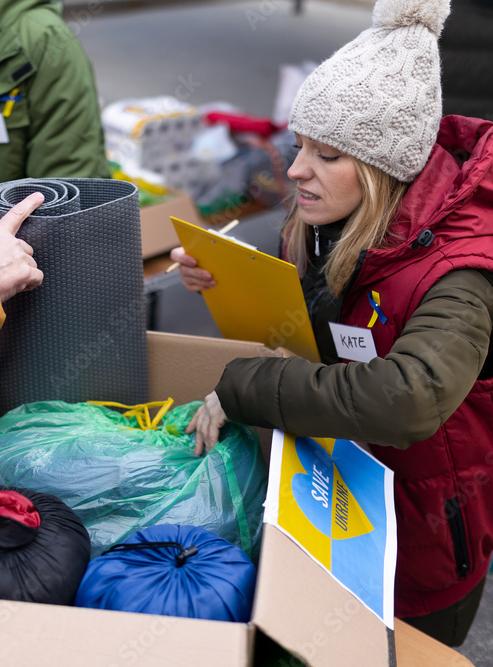
“Like a miracle”: Thousands of volunteers mobilized to help the people of Ukraine
It turns out that organising music festivals prepares you for the start of a war. This is what the Folkowisko Foundation discovered when Russia invaded Ukraine.
Located in Gorajec, Poland, near the border with Ukraine, Folkowisko was an association putting together cultural events, including its cornerstone folk music festival. Founded some 13 years ago, it prided itself on its cross-border approach, celebrating the pre-Second World War culture of the region – part Ukrainian, part Polish, mostly Jewish.
In February of last year, Folkowisko co-founder Marcin Piotrowski met with a local refugee reception centre. “They knew that Folkowisko was very close to the border,” says Piotrowski. “We scheduled a meeting for a Friday, and the war started on Thursday.”
On day two of the war, Piotrowski and others from Folkowisko became the first Polish people to enter Ukraine, helping at one of the key border crossings. “There was panic because no one was ready. There were eight points between Poland and Ukraine where people could cross, and it went very slowly.”
Crowd control
Over the years, Folkowisko has trained some 250 volunteers to deal with logistics at festivals. “The situation at the border was very similar,” says Piotrowski. “When you have thousands of people in one place, you use the same techniques. And we have equipment – tents, heaters, fencing, gates.”
Food and tents were waiting in Poland, “but the biggest problem was on the Ukrainian side. Endless traffic. There were 20,000 or 30,000 people – women, kids, people with disabilities, students from Africa, from India, foreigners from all over. The men were saying goodbye to their kids, to their wives. It was heartbreaking.”
Even Piotrowski’s bed & breakfast, which he runs with his wife, became a refugee reception centre. “We had 180 people coming through our home every day. We just gave them some food and sent them deeper into Poland.”
Folkowisko was soon in charge of providing humanitarian relief and medical assistance at four of the border crossings. “In those first few days, we lost six people due to the cold and stress and the panic. We saw kids freeze to death at the border.”
‘It was like a miracle’
The word got out that Folkowisko needed help, and volunteers began arriving from around the world. Two key Polish family foundations – one in Canada and one in the US – mobilised fundraisers and deliveries. The King Baudouin Foundation in Canada raised €250,000 in donations.
“It was incredible, it was like a miracle,” says Piotrowski. “A generator that is worth $20,000 arrived from abroad to send to the hospital. We got five ambulances, just like that. It was amazing how quickly people reacted.”
Since then, some 2,000 volunteers from every corner of the globe have gone to the Gorajec area. Some of them were specialised in emergency or medical response, but many of them were just people who wanted to help. “We arrived here in a bus loaded with supplies,” says a volunteer from Amsterdam called Claire. “I think it’s easy to not take any kind of responsibility because this is so far from home. You think there’s nothing you can do. But there really is something you can do. This place is proof of that.”
Volunteers for Ukraine was launched in the US and mobilised hundreds of people to come to Gorajec. Philip Ramos of the New York State Assembly came with a team. “We are so impressed by the amount of humanitarian aid that has arrived here,” he says. “Just a few months ago, this organisation was in charge of a festival, and now it has morphed into something that is affecting the population of an entire country. This is not government run, this is run by the hearts of the Polish people.”
Giving hope
The volunteers were put to work receiving, sorting and reloading supplies to send into Ukraine. During the first month of the war alone, Folkowisko sent nearly 3,000 tons of humanitarian aid to hard-hit cities such as Mariupol, Kiev and Kharkiv. It has also created a medical centre in a former Russian Kolkhoz in Nahaczów, a Ukrainian village called Nahaczów (Eng. Nahachiv) near the border.
Now, more than a year into the war, the number of people involved has dropped off drastically, and Folkowisko has begun to concentrate on longer-term efforts. A key programme involves Israeli experts training local social workers and psychologists in handling trauma. Seeds are being delivered to Ukrainian households as part of the Victory Garden project, so families can grow their own food.
"You think there’s nothing you can do but there really is something you can do. This place is proof of that."
But Folkowisko still needs volunteers. “They bring a new spirit into the team, new energy,” says Piotrowski. “For the Victory Garden, two cars travelled across Ukraine with people from Poland and the UK. It is important to the Ukrainians in small villages that some foreigners are coming to give them support. We are not giving food anymore; we are giving hope.”
Other press releases

Philea takes over coordination of Transnational Giving Europe
Today, coordination of Transnational Giving Europe (TGE), the network enabling European donors to make donations quickly and easily across most EU countries, was transferred from…

Pluralis created as impact investment vehicle to help preserve the editorial independence of news organisations in Europe
The King Baudouin Foundation has helped launch Pluralis, a coalition of European media groups, investors and foundations that will bolster independent news in Europe.